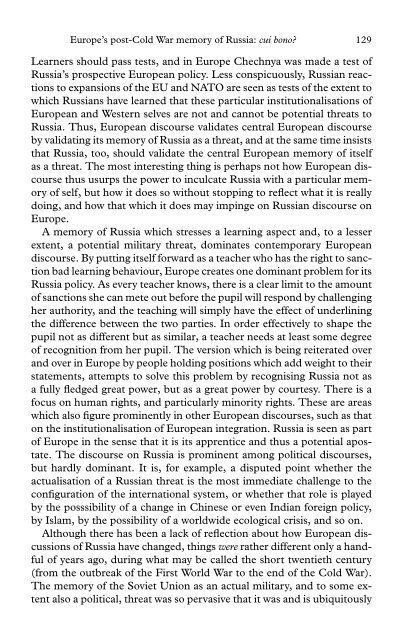Memory and Power in Post-War Europe: Studies in the Presence of ...
Memory and Power in Post-War Europe: Studies in the Presence of ...
Memory and Power in Post-War Europe: Studies in the Presence of ...
You also want an ePaper? Increase the reach of your titles
YUMPU automatically turns print PDFs into web optimized ePapers that Google loves.
<strong>Europe</strong>’s post-Cold <strong>War</strong> memory <strong>of</strong> Russia: cui bono? 129<br />
Learners should pass tests, <strong>and</strong> <strong>in</strong> <strong>Europe</strong> Chechnya was made a test <strong>of</strong><br />
Russia’s prospective <strong>Europe</strong>an policy. Less conspicuously, Russian reactions<br />
to expansions <strong>of</strong> <strong>the</strong> EU <strong>and</strong> NATO are seen as tests <strong>of</strong> <strong>the</strong> extent to<br />
which Russians have learned that <strong>the</strong>se particular <strong>in</strong>stitutionalisations <strong>of</strong><br />
<strong>Europe</strong>an <strong>and</strong> Western selves are not <strong>and</strong> cannot be potential threats to<br />
Russia. Thus, <strong>Europe</strong>an discourse validates central <strong>Europe</strong>an discourse<br />
by validat<strong>in</strong>g its memory <strong>of</strong> Russia as a threat, <strong>and</strong> at <strong>the</strong> same time <strong>in</strong>sists<br />
that Russia, too, should validate <strong>the</strong> central <strong>Europe</strong>an memory <strong>of</strong> itself<br />
as a threat. The most <strong>in</strong>terest<strong>in</strong>g th<strong>in</strong>g is perhaps not how <strong>Europe</strong>an discourse<br />
thus usurps <strong>the</strong> power to <strong>in</strong>culcate Russia with a particular memory<br />
<strong>of</strong> self, but how it does so without stopp<strong>in</strong>g to reflect what it is really<br />
do<strong>in</strong>g, <strong>and</strong> how that which it does may imp<strong>in</strong>ge on Russian discourse on<br />
<strong>Europe</strong>.<br />
A memory <strong>of</strong> Russia which stresses a learn<strong>in</strong>g aspect <strong>and</strong>, to a lesser<br />
extent, a potential military threat, dom<strong>in</strong>ates contemporary <strong>Europe</strong>an<br />
discourse. By putt<strong>in</strong>g itself forward as a teacher who has <strong>the</strong> right to sanction<br />
bad learn<strong>in</strong>g behaviour, <strong>Europe</strong> creates one dom<strong>in</strong>ant problem for its<br />
Russia policy. As every teacher knows, <strong>the</strong>re is a clear limit to <strong>the</strong> amount<br />
<strong>of</strong> sanctions she can mete out before <strong>the</strong> pupil will respond by challeng<strong>in</strong>g<br />
her authority, <strong>and</strong> <strong>the</strong> teach<strong>in</strong>g will simply have <strong>the</strong> effect <strong>of</strong> underl<strong>in</strong><strong>in</strong>g<br />
<strong>the</strong> difference between <strong>the</strong> two parties. In order effectively to shape <strong>the</strong><br />
pupil not as different but as similar, a teacher needs at least some degree<br />
<strong>of</strong> recognition from her pupil. The version which is be<strong>in</strong>g reiterated over<br />
<strong>and</strong> over <strong>in</strong> <strong>Europe</strong> by people hold<strong>in</strong>g positions which add weight to <strong>the</strong>ir<br />
statements, attempts to solve this problem by recognis<strong>in</strong>g Russia not as<br />
a fully fledged great power, but as a great power by courtesy. There is a<br />
focus on human rights, <strong>and</strong> particularly m<strong>in</strong>ority rights. These are areas<br />
which also figure prom<strong>in</strong>ently <strong>in</strong> o<strong>the</strong>r <strong>Europe</strong>an discourses, such as that<br />
on <strong>the</strong> <strong>in</strong>stitutionalisation <strong>of</strong> <strong>Europe</strong>an <strong>in</strong>tegration. Russia is seen as part<br />
<strong>of</strong> <strong>Europe</strong> <strong>in</strong> <strong>the</strong> sense that it is its apprentice <strong>and</strong> thus a potential apostate.<br />
The discourse on Russia is prom<strong>in</strong>ent among political discourses,<br />
but hardly dom<strong>in</strong>ant. It is, for example, a disputed po<strong>in</strong>t whe<strong>the</strong>r <strong>the</strong><br />
actualisation <strong>of</strong> a Russian threat is <strong>the</strong> most immediate challenge to <strong>the</strong><br />
configuration <strong>of</strong> <strong>the</strong> <strong>in</strong>ternational system, or whe<strong>the</strong>r that role is played<br />
by <strong>the</strong> posssibility <strong>of</strong> a change <strong>in</strong> Ch<strong>in</strong>ese or even Indian foreign policy,<br />
by Islam, by <strong>the</strong> possibility <strong>of</strong> a worldwide ecological crisis, <strong>and</strong> so on.<br />
Although <strong>the</strong>re has been a lack <strong>of</strong> reflection about how <strong>Europe</strong>an discussions<br />
<strong>of</strong> Russia have changed, th<strong>in</strong>gs were ra<strong>the</strong>r different only a h<strong>and</strong>ful<br />
<strong>of</strong> years ago, dur<strong>in</strong>g what may be called <strong>the</strong> short twentieth century<br />
(from <strong>the</strong> outbreak <strong>of</strong> <strong>the</strong> First World <strong>War</strong> to <strong>the</strong> end <strong>of</strong> <strong>the</strong> Cold <strong>War</strong>).<br />
The memory <strong>of</strong> <strong>the</strong> Soviet Union as an actual military, <strong>and</strong> to some extent<br />
also a political, threat was so pervasive that it was <strong>and</strong> is ubiquitously
















